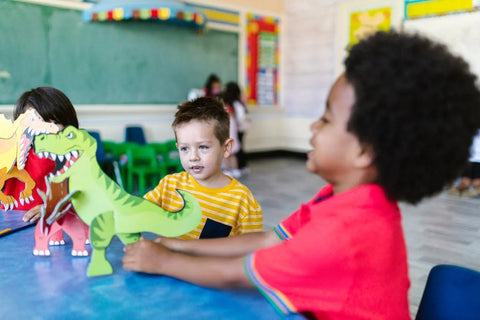We get it!
This probably sounds like a super duper challenge for most of us parents. Staying calm and not losing your cool is something that all of us as parents struggle with.
Regarding studies and learning, parents tend to get overboard. They cannot fathom that their child might be a slow learner or has a different inclination than the subjects taught for professional education!
We have come up with a suggestion to help your child learn and develop cognitive realization early on.
Play as Therapy: Get Onboard to Learn and Adapt!
Children tend to learn more from their environment and from activities that involve play and interaction. Such activities help instill learning and simultaneously boost their recall power, thus helping their memory enhancement in the long run.
Here are some examples of Play activities that can help:
Allowing Time for Cognitive Play!

This is what we would generally label as daydreaming. We usually miss the point that a child, when sitting idle, is observing things around him, trying to absorb the surroundings and questioning things he sees.
This help shapes his cognitive development and makes him more aware of his surroundings, builds his problem-solving skills and helps them add to their imagination.
Encouraging Parallel Play

This is where we allow two or more kids to play in the same spot with their own toys or engagement activities. Such activities allow children to learn from each other.
Using ideas and concepts printed on T-shirts helps toddlers learn from each other. For example, a Color Name tee can be super helpful for kids to pick colors from.
Focus on Constructive Play

This is more like traditional play, but it has additional benefits. We allow the child to play with blocks or other similar toys in constructive play.
These toys help enhance the child’s spatial abilities and, at the same time, help him/her understand the concept of constructing new things using their motor skills.
Competitive Play For Confidence Building

This kind of play encourages the kids to come forward and learn better. They try to be aware of their surroundings and follow the rules. The reward at the end of competitive play is the key driving force.
Teaching them counting and helping them learn by setting up competitions related to times tables or mental maths can help. Using counting gloves and Multiplication sheets as educational aid tools can greatly help.
Final Word
When it comes down to teaching children, play concepts can be overwhelming as children can be distracted. But with time, the children adapt.
Generally, children taught with interactive play better grasp concepts than children taught in controlled setups. As the focus shifts toward skill development, interactive teaching methods are the most preferred forms of teaching!

